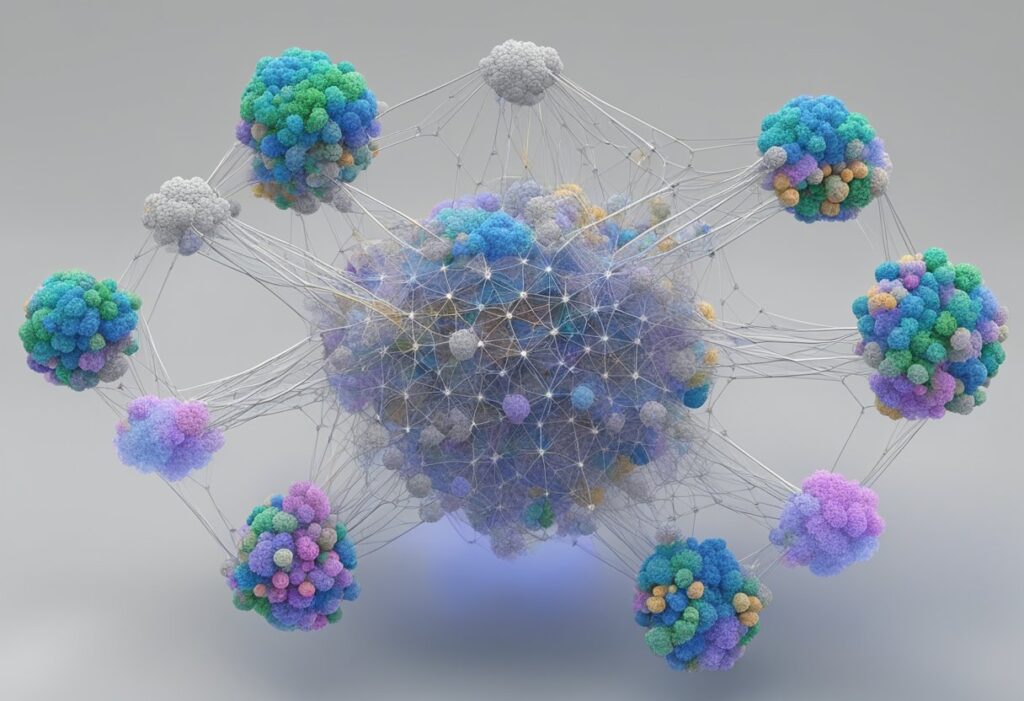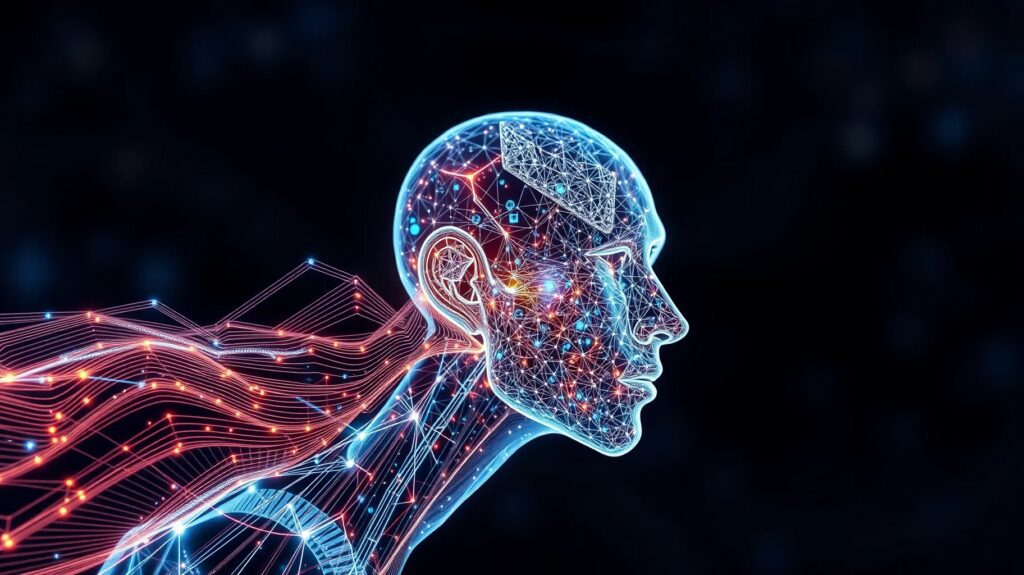
Introduction
Proteins are the building blocks of life, playing a crucial role in virtually all biological processes. Understanding how proteins fold into their complex three-dimensional structures has long been a formidable challenge. This issue, known as the protein folding problem, has stymied scientists for decades. However, with the advent of AlphaFold, we’re on the cusp of a revolutionary breakthrough in biology and medicine.
The Protein Folding Problem
Importance of Protein Folding
- Proteins need to fold into specific shapes to perform their functions correctly.
- Misfolded proteins can lead to diseases like Alzheimer’s and cystic fibrosis.
Historical Challenges
- Predicting how a protein will fold based on its amino acid sequence has been incredibly difficult.
- The complexity of this process has made it a major scientific conundrum.
Traditional Methods of Protein Structure Prediction
Experimental Techniques
- X-ray crystallography
- NMR spectroscopy
- Cryo-EM
Computational Approaches
- Molecular dynamics
- Homology modeling
Limitations
- Time-consuming and expensive
- Often lack the precision needed for detailed predictions
AlphaFold: Cracking the Code of Protein Folding
Proteins are the building blocks of life, but understanding how they fold into complex structures has long been a scientific mystery. Enter AlphaFold, an artificial intelligence (AI) breakthrough that’s revolutionizing the way we decode protein folding. This AI system, developed by DeepMind, promises to unlock new possibilities in biology, medicine, and beyond.
What is Protein Folding?
Protein folding is the process by which a protein chain acquires its functional three-dimensional structure. This intricate dance determines a protein’s function and its role in biological processes. Misfolded proteins can lead to diseases like Alzheimer’s and Parkinson’s, making the study of protein folding crucial for medical research.
The Challenge of Protein Folding
For decades, scientists have struggled to predict protein structures from amino acid sequences. Traditional methods are time-consuming and often require expensive equipment. AlphaFold changes the game by using advanced algorithms to predict protein structures with remarkable accuracy.
How AlphaFold Works
AlphaFold employs deep learning techniques to predict protein structures. It uses a vast database of known protein shapes to train its models, which can then infer the structure of new proteins. This process involves analyzing the relationships between amino acids and their likely spatial arrangements.
Deep Learning and Neural Networks
AlphaFold relies on deep learning and neural networks to make its predictions. These networks are trained on large datasets, learning to recognize patterns and relationships within the data. AlphaFold’s neural networks can predict how a protein’s amino acid sequence will fold into its three-dimensional structure.
Breakthrough Achievements
In 2020, AlphaFold achieved a milestone by outperforming other methods in the Critical Assessment of Structure Prediction (CASP) competition. Its predictions were often indistinguishable from those obtained through experimental methods, marking a significant advancement in the field.
CASP Competition: A Benchmark for Success
The CASP competition serves as a benchmark for evaluating protein structure prediction methods. AlphaFold’s success in CASP demonstrated its ability to accurately predict protein structures, providing a new tool for scientists worldwide.
Implications for Medicine
AlphaFold’s ability to predict protein structures could revolutionize drug discovery and development. By understanding how proteins fold, researchers can design more effective drugs and therapies. This could lead to treatments for diseases that have long eluded medical science.
Drug Discovery and Design
Drug discovery relies on understanding the interactions between proteins and potential drug molecules. AlphaFold’s predictions can help researchers identify targets for new drugs, speeding up the development process and reducing costs.
Impact on Biology
Beyond medicine, AlphaFold’s insights into protein folding could enhance our understanding of fundamental biological processes. This knowledge might lead to innovations in biotechnology, agriculture, and environmental science, opening new avenues for research and application.
Innovations in Biotechnology
Biotechnology can benefit from AlphaFold’s predictions by improving the design of enzymes and other proteins used in industrial processes. This can lead to more efficient and sustainable production methods.
The Future of AlphaFold
The potential of AlphaFold is vast. As the technology continues to evolve, it could become an essential tool in labs worldwide. Future developments might include integrating AlphaFold with other AI systems, further enhancing its predictive capabilities.
AI Integration and Synergy
Integrating AlphaFold with other AI systems could lead to even more accurate predictions and new applications. Combining different AI approaches can leverage their strengths, creating a powerful toolkit for scientists.
Challenges and Limitations
While AlphaFold is a groundbreaking tool, it is not without challenges. The complexity of some proteins means predictions are not always perfect. Continued research and development are necessary to address these limitations and improve accuracy.
Addressing Complex Proteins
Some proteins have complex structures that are difficult to predict. Researchers are working to refine AlphaFold’s algorithms and incorporate additional data to improve its accuracy for these challenging cases.
Ethical Considerations
The use of AI in biology raises important ethical questions. Ensuring that AlphaFold and similar technologies are used responsibly and transparently is crucial. Collaboration between scientists, ethicists, and policymakers will be essential in navigating these issues.
Responsible AI Use
Responsible AI use involves ensuring transparency, accountability, and ethical considerations in the development and application of technologies like AlphaFold. This includes addressing potential biases and ensuring equitable access to the benefits of AI.
Collaborative Efforts
AlphaFold’s success is a testament to the power of collaboration. DeepMind’s partnership with the scientific community has been instrumental in refining and validating the technology. Continued cooperation will be vital for future breakthroughs.
Global Scientific Collaboration
Global collaboration among scientists, institutions, and industries is essential for maximizing AlphaFold’s impact. Sharing data, resources, and expertise can accelerate progress and lead to new discoveries.
Open Access and Data Sharing
DeepMind has made AlphaFold’s data and code available to the public, fostering a spirit of open science. This openness allows researchers worldwide to leverage AlphaFold in their work, accelerating scientific progress.
The Importance of Open Science
Open science promotes transparency and collaboration, enabling researchers to build on each other’s work. By sharing data and tools, scientists can make faster progress and address global challenges more effectively.
Real-World Applications
Already, AlphaFold is being used in various real-world applications. From studying the spike protein of the coronavirus to understanding plant biology, the potential uses are vast and varied. This versatility underscores the transformative power of the technology.
Coronavirus Research
AlphaFold has contributed to coronavirus research by predicting the structure of the spike protein, aiding in the development of vaccines and treatments. This highlights its potential to address urgent public health challenges.
Educational Opportunities
As AlphaFold becomes more integrated into scientific research, educational institutions are incorporating it into their curricula. Training the next generation of scientists in AI and computational biology will be crucial for future advancements.
AI and Computational Biology Education
Educational programs are evolving to include training in AI and computational biology. This prepares students to use cutting-edge tools like AlphaFold in their research, driving future innovations.
Conclusion: A New Era in Science
AlphaFold represents a leap forward in our ability to understand and manipulate biological systems. Its impact on protein folding and related fields is profound, heralding a new era of scientific discovery and innovation.
References
For further reading and detailed information, check out the DeepMind’s AlphaFold page and explore resources on the Protein Data Bank.
Research Papers and Articles
- AlphaFold: A Solution to a 50-Year-Old Grand Challenge in Biology
- DeepMind’s Blog on AlphaFold
- Overview of AlphaFold’s development and its impact on protein folding.
- Highly Accurate Protein Structure Prediction with AlphaFold
- Nature Article on AlphaFold
- Detailed scientific paper published in Nature, outlining the methodology and achievements of AlphaFold.
- AlphaFold and the Future of Structural Biology
- Science Article on AlphaFold
- An in-depth look at how AlphaFold is changing the landscape of structural biology.
Public Databases
- Protein Data Bank (PDB)
- Protein Data Bank
- A comprehensive database of protein structures where you can find AlphaFold’s predictions integrated.
- UniProt
- UniProt
- A protein sequence and functional information database that includes AlphaFold predictions.
Websites and Online Resources
- DeepMind’s AlphaFold Page
- DeepMind’s AlphaFold
- Official page with detailed information about AlphaFold’s development and applications.
- EMBL-EBI AlphaFold Protein Structure Database
- AlphaFold Protein Structure Database
- A database developed by EMBL-EBI in collaboration with DeepMind, providing access to AlphaFold predictions.
- CASP (Critical Assessment of protein Structure Prediction)
- CASP
- Official website for the CASP competitions, showcasing the performance of various protein structure prediction methods, including AlphaFold.
Videos and Webinars
- DeepMind AlphaFold Explanation
- YouTube: AlphaFold – the making of a scientific breakthrough
- A video by DeepMind explaining the journey and significance of AlphaFold.
- CASP14 Conference Presentation
- YouTube: CASP14 AlphaFold Presentation
- Presentation by the DeepMind team at the CASP14 conference, detailing AlphaFold’s performance and advancements.
- AI for Protein Folding: AlphaFold and Beyond
- YouTube: AI for Protein Folding
- A comprehensive webinar discussing the broader implications of AI in protein folding.
Books and Reports
- Deep Learning for the Life Sciences: Applying Deep Learning to Genomics, Microscopy, Drug Discovery, and More
- Deep Learning for the Life Sciences
- A book that includes discussions on how deep learning techniques like those used in AlphaFold are transforming life sciences.
- Artificial Intelligence in Drug Discovery
- Artificial Intelligence in Drug Discovery
- This book explores various AI applications in drug discovery, including the role of AlphaFold in predicting protein structures.
Online Courses
- Coursera: Deep Learning Specialization by Andrew Ng
- Deep Learning Specialization
- A comprehensive course that covers the fundamentals of deep learning, providing context for understanding technologies like AlphaFold.
- edX: AI for Everyone by Andrew Ng
- AI for Everyone
- A beginner-friendly course that provides an overview of AI applications, including in the field of biology.
These resources should provide a thorough foundation for understanding the significance of AlphaFold in the context of protein folding and its broader impact on scientific research.





